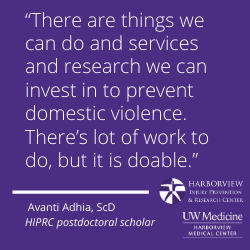
From her time as an undergrad student at Columbia to her career in public health research, HIPRC postdoctoral scholar Avanti Adhia, ScD, has had a passion for helping others and making a change in the field of domestic violence (DV).
Adhia’s career started back in 2008 where she worked as a peer educator and advocate at her Campus Rape Crisis Center. It was here she saw firsthand how DV and other types of interpersonal violence could impact so many lives.
“I really saw the damaging effects on survivors and the negative outcomes on their schoolwork, in their communities and friends, on their mental health, and really how pervasive this problem was,” Adhia says.
This drove her to pursue violence prevention professionally, and public health allowed her to focus her graduate career on understanding the broader multilevel determinants of violence.
“I wanted to think more structurally in how we can prevent and decrease DV in a more systematic and systemic way,” Adhia says.
This month is Domestic Violence Action Month (DVAM). It’s held every October as a way to bring more awareness to the growing public health issue the nation faces. During this month, Adhia says the most important thing anyone can do for someone going through DV is to be a listening ear.
“It takes a lot for someone to share they are experiencing DV. Be supportive. Believe them and take what they are saying seriously. Try not to cast your judgement immediately,” Adhia says.
One of the biggest lessons she hopes people learn this month is that domestic violence IS preventable and there is help for anyone that needs it.
The Washington State Coalition Against Domestic Violence (WSCADV) says there are three strategies someone can take to help someone suffering abuse:
Through all this work, Adhia’s research focuses now include intimate partner violence, sexual violence, adolescent health, and social epidemiology. She says DV is not inevitable; this is what keeps her going and keeps her working hard to prevent anyone from experiencing DV.
“There are things we can do and services and research we can invest in to prevent DV. There’s lot of work to do, but it is doable,” Adhia says.
If you or someone you love is experiencing domestic violence, there is help 24/7. To talk to someone call the National Domestic Violence Hotline: 1-800-799-7233. Washington State has over 70 domestic violence programs.
Washington State Coalition Against Domestic Violence (local)
Washington Coalition of Sexual Assault Programs (local)
The National Domestic Violence Hotline
For more DV resources, visit our resource page.
